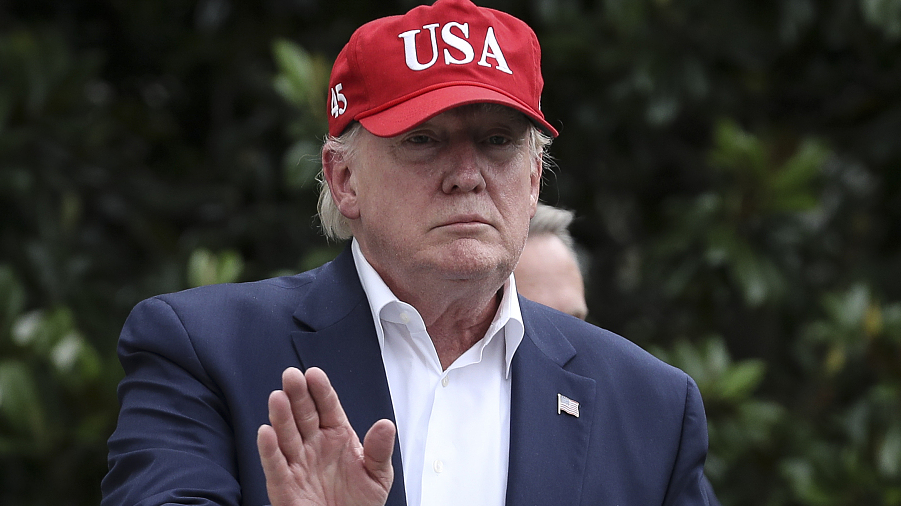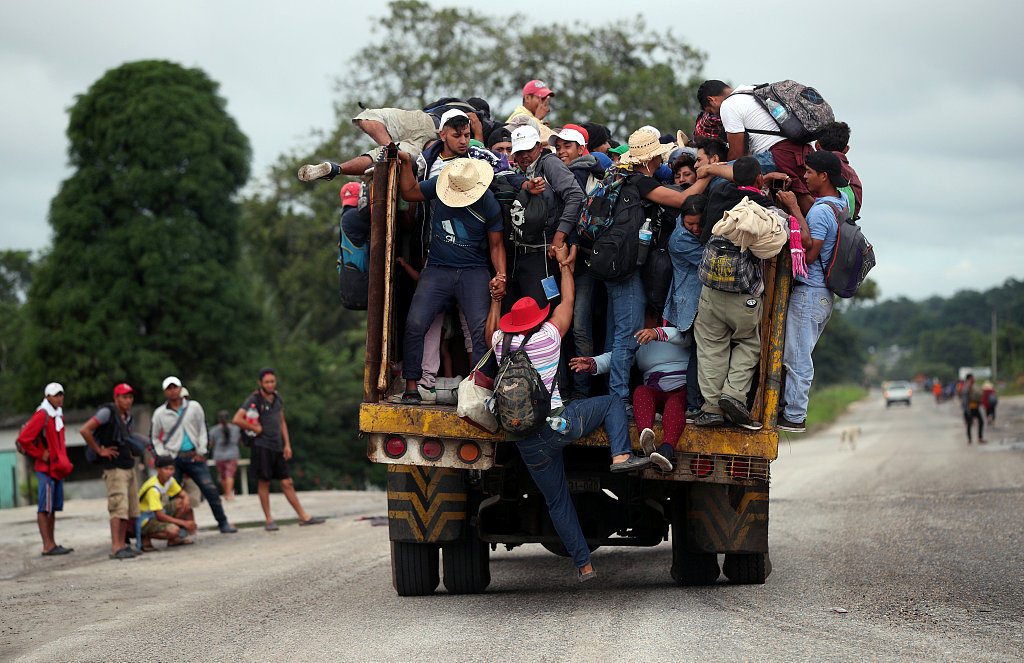

Editor's note: Anne O. Krueger, a former World Bank chief economist and former first deputy managing director of the International Monetary Fund, is senior research professor of international economics at the School of Advanced International Studies, Johns Hopkins University, and senior fellow at the Center for International Development, Stanford University. The article reflects the author's opinion, and not necessarily the views of CGTN.
Late last month, U.S. President Donald Trump threatened to impose tariffs on imports from Mexico in 10 days if it did not halt the flow of migrants from Central America. The tariffs would start at 5 percent and then increase by five percentage points monthly until reaching 25 percent in October. The announcement came as a shock, especially given that the United States and Mexico (plus Canada) had reached an agreement on a revised North American Free Trade Agreement just months earlier, at Trump's insistence. Ratification of the new trade deal, the U.S.-Mexico-Canada Agreement (USMCA), is now in jeopardy.
The Trump administration's flailing efforts to reduce the flow of migrants arriving at the U.S.-Mexico border have long been a source of public spectacle. In this instance, after a few days of deep uncertainty, Mexico and the U.S. announced that they had reached an agreement whereby Mexico would take steps to stem the flow of migrants, and the U.S. would refrain from imposing tariffs. Precisely what actions Mexico would take went largely unspecified, or had already been promised months earlier.

Migrants, part of a caravan of thousands traveling from Central America en route to the United States, hitchhike on a truck along the highway to Isla from Sayula de Aleman, Mexico, November 3, 2018. /VCG Photo
Nonetheless, Trump, resembling British Prime Minister Neville Chamberlain after his return from Munich in 1938, waved a piece of paper in front of reporters, claiming that it held proof of Mexico's commitment to accede to U.S. wishes. Trump made it clear that if illegal immigration does not decrease at the rate he wants, he will carry out his threats.
Though tariffs were avoided, Trump's brinkmanship has come at a high cost. Most important, the threat (which seemed credible) constitutes a major breach of global trade rules. The likely response from other countries is almost certain to weaken the system, reduce trade, and slow global growth further.
As for the threatened tariffs themselves, they would have severely disrupted the value chains of the North American auto industry and many other sectors. They also would have been self-defeating. Given that 80 percent of Mexico's total exports go to the U.S., the effects on Mexico would have been economically crippling and politically destabilizing, leaving the country even less equipped to do anything about illegal immigration.
Unlike the USMCA, which was at least premised on the goal of addressing trade issues, Trump's tariff pronunciamento was a bald-faced attempt to force the Mexican government to solve America's own immigration problem. In other words, a trade weapon was being deployed neither to address a trade issue nor as part of a legitimate sanctions regime, such as that imposed on Russia following its illegal annexation of Crimea in 2014. On the rare occasions when trade sanctions have been used for non-trade reasons, they were a measure of last resort, as in the case of apartheid South Africa, where they succeeded because they had multilateral support.

U.S. President Donald trump announced Thursday that the U.S. and Mexico have reached an agreement to suspend imposing tariffs on Mexico, June 7, 2019. /VCG Photo
Once trade measures are used indiscriminately to advance non-trade objectives, the damage to the entire trading system is done – and it can be enormous. The Trump administration's willingness to weaponize tariffs for any purpose invites all other countries to do the same, and casts a cloud of uncertainty over international commerce. Protectionist forces in other countries have no reason not to use Trump's threats to support their own demands in non-trade disputes.
Moreover, the violation of World Trade Organization rules by the U.S. leaves other countries with little reason to negotiate preferential trading arrangements or further tariff reductions, given that their efforts could later be squandered in a forced renegotiation. At this point, all governments must assume that U.S. tariffs might be used against them. Because the U.S. is large enough to devastate many smaller economies, any responsible government must reduce its exposure.
At the same time, other large countries that are in a position to deploy punitive trade measures against those they don't like will now feel free to do so. The threat of new tariffs will inevitably lead small countries to align themselves with one large country or another, for fear of being caught in the middle. The risk that the entire global economy will break up into discrete trading blocs cannot be discounted. Were that to happen, the resulting costs to all countries would be enormous.
As if this weren't bad enough, Trump's blundering threats have clearly alienated a large majority of Mexicans. After years of hostility, Mexico and the U.S. had finally started to grow closer over the past three decades, much to the benefit of both countries. Mexico is of great strategic importance to the U.S., as one of its largest trading partners and one of only two countries with which it shares a border. Now, according to some reports, 84 percent of Mexicans believe that they should unite behind Mexican President Andrés Manuel López Obrador in standing against the U.S..

Migrants, part of a caravan traveling from Central America to the United States, dance in a public square in Mexico, November 3, 2018. /VCG Photo
Looking ahead, it is highly unlikely that the flow of migrants traveling to the U.S. will decline by enough to satisfy the self-proclaimed "tariff man." The U.S. has been taking measures unsuccessfully to reduce undocumented migration since the 1950s. And the European Union has struggled to stop the flow of migrants and refugees arriving from the Middle East and Africa.
If the U.S. and the EU cannot do it, what reason is there to believe that Mexico can? Even if Mexico did manage to pull off a miracle, the damage to the global economy, the trading system, and to America's standing in the world is done; and it is substantial. Trump has opened a Pandora's box, and we will all have to live with the forces he has unleashed on the world.
Copyright: Project Syndicate, 2019.
(If you want to contribute and have specific expertise, please contact us at opinions@cgtn.com.)

Copyright © 2018 CGTN. Beijing ICP prepared NO.16065310-3
Copyright © 2018 CGTN. Beijing ICP prepared NO.16065310-3